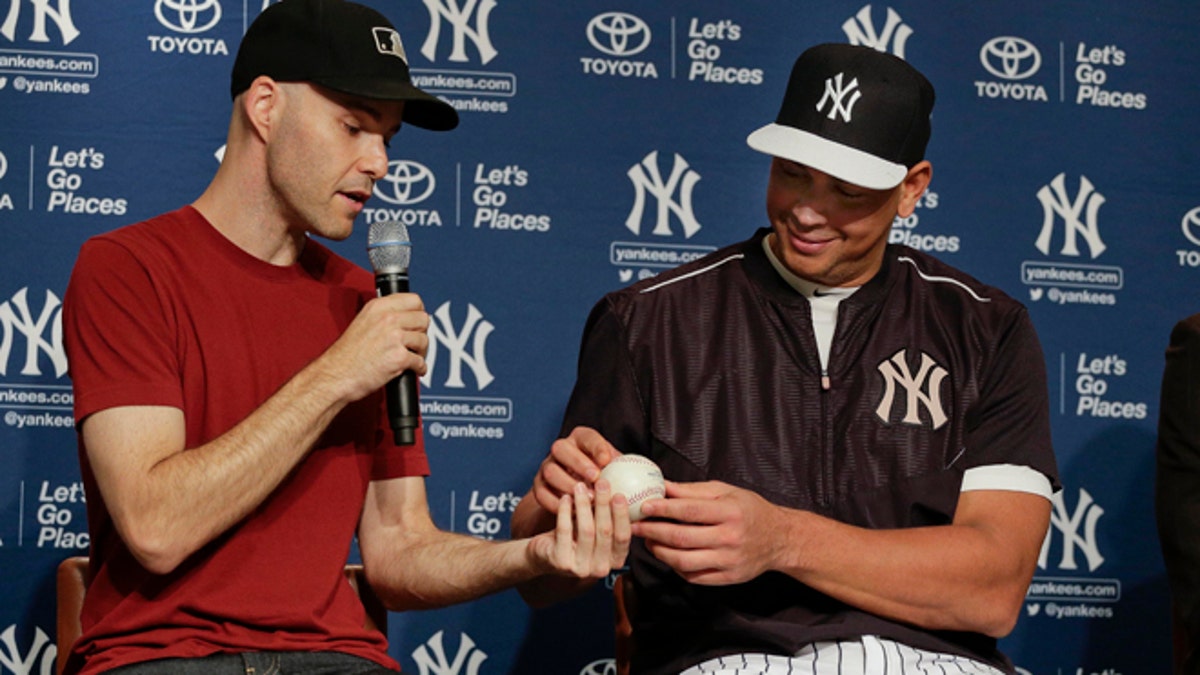
July 3, 2015: Zack Hample, left, presents New York Yankees Alex Rodriguez with the baseball on which Rodriguez got his 3,000th career hit during a news conference. (AP Photo/Julie Jacobson)
The New York Yankees’ Alex Rodriguez finally received his 3,000th hit baseball Friday, when he and the organization settled its dispute over a marketing payment with a deal that gives $3.5 million to charitable groups, saves the team $5.5 million and gets Rodriguez his prized possession.
When the Yankees and Rodriguez agreed to his mega 10-year, $275 million contract in December 2007, the team reached an agreement that would pay him $6 million for up to five milestone accomplishments in exchange for marketing rights, such as A-Rod’s name and image to sell licensed goods. The first achievement he reached was hitting his 660th home run, tying Willie Mays for fourth on the all-time list.
"I'm very happy, not only for what happened here with 3,000, but obviously with the big news of the day, which we all heard about," Rodriguez said Friday. "It's been a good day."
However, the club’s relationship with Rodriguez went south in 2013 when he was the target of Major League Baseball’s Biogenesis drug investigation. That led to A-Rod’s suspension for the entire 2014 season after then-Commissioner Bud Selig concluded he had violated the league’s drug policy. Rodriguez subsequently filed a lawsuit against MLB, the players’ union and the Yankees’ team physician, then dropped the litigation.
When Rodriguez slugged his 660th home run on May 1, New York said it has the discretion not to make the payment and declined to do so, saying his marketing rights did not have any worth. MLB and the players’ association stopped the clock on the time to file a grievance as negotiations continued.
"This has been quite a year," Rodriguez said. "Never did I think 12 months ago I would be in a position with 660 and 3,000, with two swings of the bat, to be able to influence so many people, kids, that are in need."
Under the deal, the Yankees will split $1 million among the Special Operations Warrior Foundation, the Boys & Girls Club of Tampa and Pitch In For Baseball.
The team has been a longtime funder of the Special Operations Warrior Foundation and the Boys & Girls Club of Tampa.
Zack Hample, the avid baseball collector who snagged Rodriguez’s milestone 3,000th hit ball at Yankee Stadium on June 19 when Rodriguez lifted it for a home run, supports Pitch In For Baseball, which assists children around the world through the spot. The charity was to receive $150,000.
At a news conference Friday, Hample pulled out a Ziploc bag from his backpack with the authenticated ball in it. He took the ball out of the baggie and gave it to Rodriguez.
Rodriguez said his daughters can fight over who will get to keep the ball in their bedroom.
"Who would've thunk that one swing of the bat, one home run would create so much attention," Rodriguez said. "But more importantly, such a generous donation by the Steinbrenner family to benefit your wonderful organization."
In turn, Rodriguez presented Hample with an autographed jersey and two autographed bats, one with the message written on it, "Nice catch."
Hample has collected more than 8,100 balls during batting practice and games.
"It's definitely hard to give up the ball," Hample said earlier in the day at his Manhattan apartment. "It's the centerpiece of my collection. The thing I really wanted was the ball, more than any other memorabilia. But it's going for a good cause. That was the main part of this, so it all turned out well."
The Yankees will donate $2.5 million to the MLB Urban Youth Foundation, to be used in programs to increase youth participation in baseball, with a focus on urban areas. Baseball Commissioner Rob Manfred will pick the initiatives after speaking with Rodriguez, and Manfred promised to consider charitable activities the player has focused on.
In addition to saving $2.5 million — the difference between the $6 million originally called for and the charitable payments the team agreed to make— the Yankees will save $3 million in luxury tax, since Rodriguez will not be receiving the money personally. New York pays at a 50 percent rate on the portion of its payroll above the $189 million threshold.
The Associated Press contributed to this report
